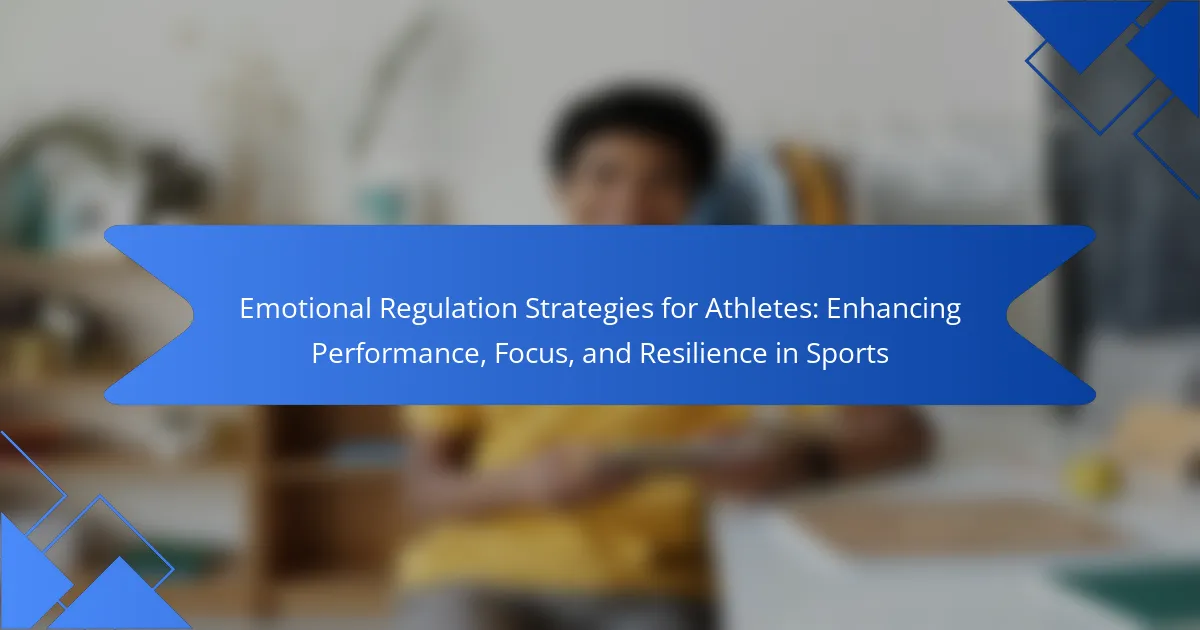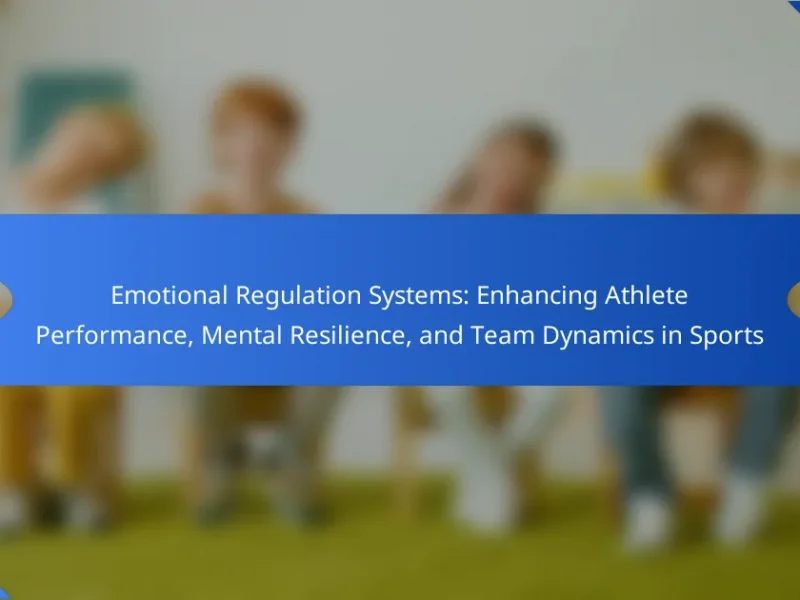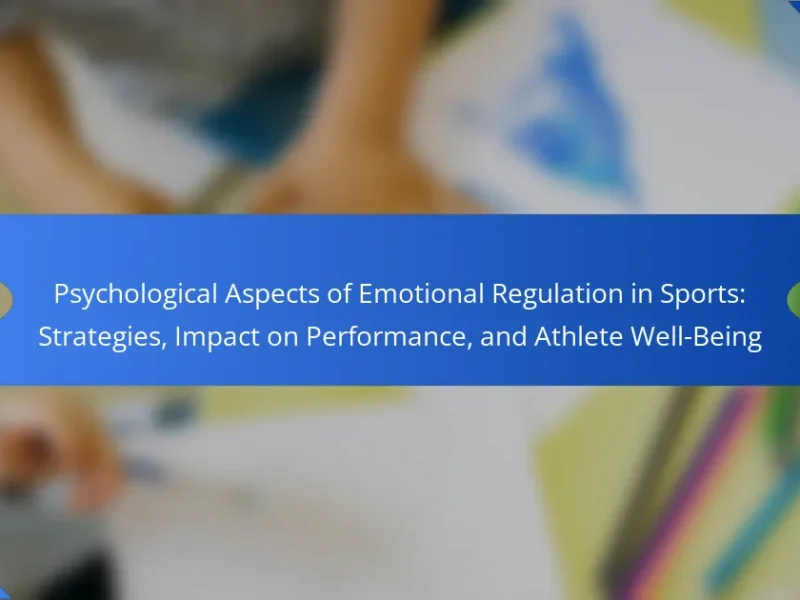Emotional regulation strategies are essential for athletes looking to enhance their performance and resilience in competitive sports. This article explores techniques like mindfulness, cognitive restructuring, and self-talk, which improve focus and emotional control. It also discusses the importance of awareness, control, and adaptation in emotional regulation systems. Lastly, we examine how unique attributes, such as adaptability and neuroplasticity, contribute to effective emotional management in athletic contexts.
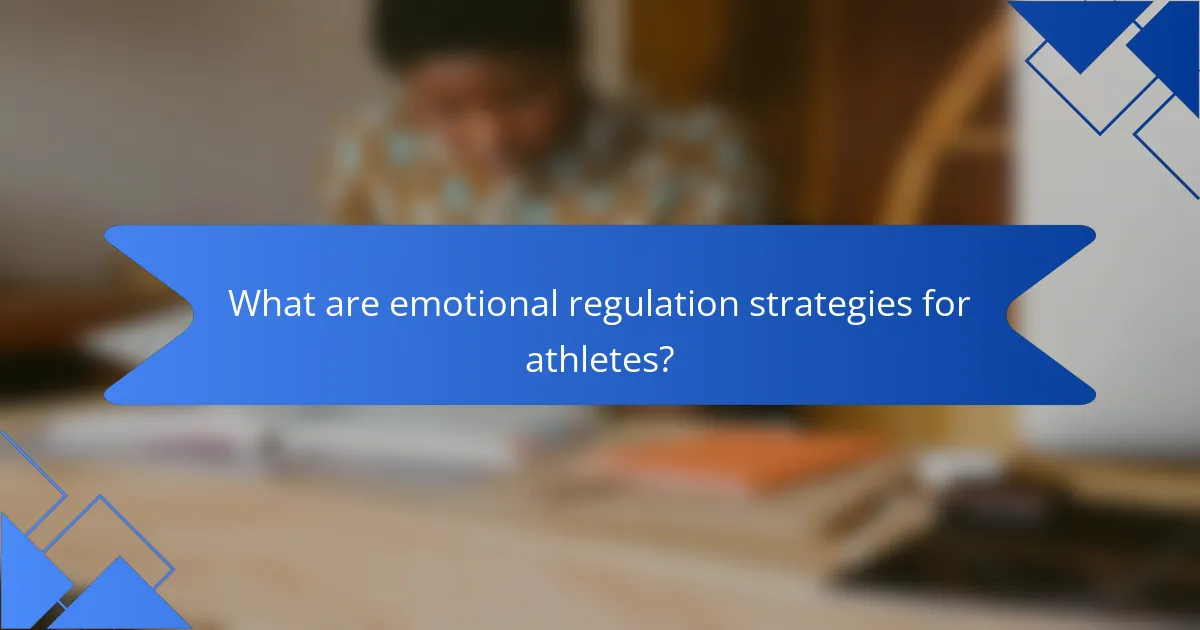
What are emotional regulation strategies for athletes?
Emotional regulation strategies for athletes include mindfulness, cognitive restructuring, and self-talk techniques. These approaches enhance performance by improving focus and resilience under pressure. Mindfulness helps athletes stay present, reducing anxiety. Cognitive restructuring allows them to reframe negative thoughts, promoting a positive mindset. Self-talk techniques reinforce confidence and motivation, crucial for peak performance. Implementing these strategies can lead to better emotional control during competitions, ultimately improving overall athletic outcomes.
How do emotional regulation strategies enhance athletic performance?
Emotional regulation strategies significantly enhance athletic performance by improving focus, resilience, and overall mental well-being. Techniques such as mindfulness, cognitive restructuring, and deep breathing help athletes manage stress and anxiety, leading to better concentration during competitions. Research indicates that athletes who effectively regulate their emotions experience improved performance metrics, including increased endurance and reduced error rates. Additionally, these strategies foster a positive mindset, which is crucial for overcoming obstacles and maintaining motivation throughout training and competition.
What role does emotional regulation play in focus during competition?
Emotional regulation significantly enhances focus during competition by helping athletes manage stress and anxiety. Effective strategies, such as mindfulness and cognitive restructuring, allow athletes to maintain optimal arousal levels. This control leads to improved concentration on performance tasks, reducing distractions. Studies show that athletes who utilize emotional regulation techniques experience heightened resilience and better overall outcomes in high-pressure situations.
How can emotional regulation contribute to resilience in sports?
Emotional regulation enhances resilience in sports by enabling athletes to manage stress and maintain focus. This skill helps athletes recover from setbacks and perform consistently under pressure. Effective strategies include mindfulness, cognitive restructuring, and breathing techniques. Research indicates that athletes with strong emotional regulation skills exhibit improved performance metrics and greater overall well-being. As a result, they can better navigate the emotional highs and lows of competitive sports.
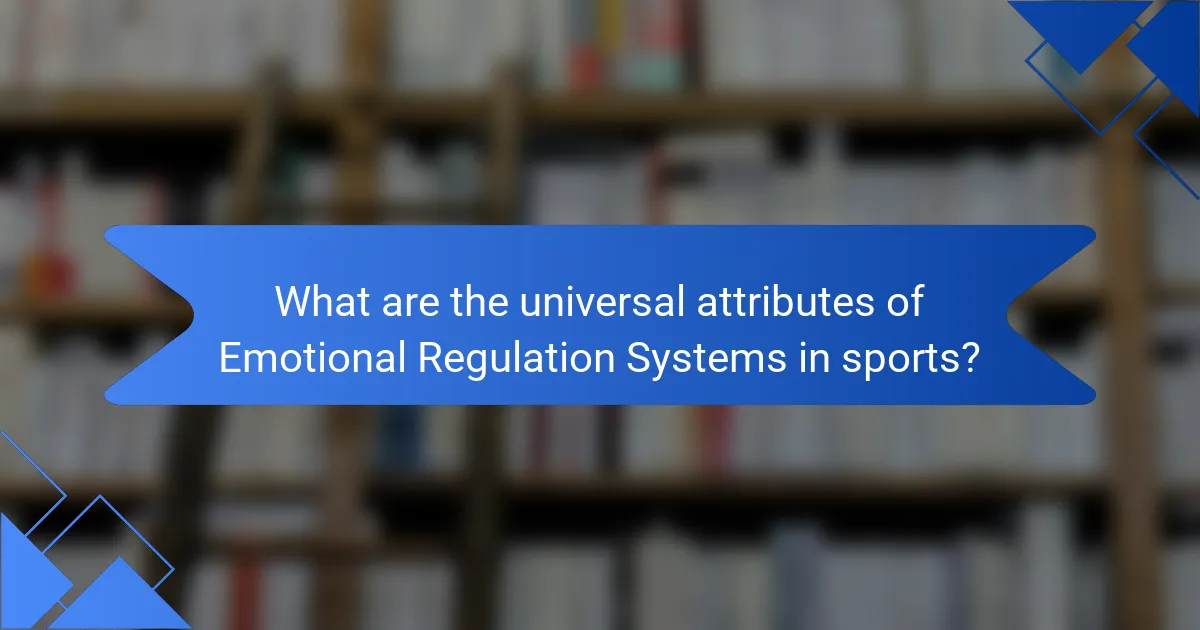
What are the universal attributes of emotional regulation systems in sports?
Emotional regulation systems in sports universally include awareness, control, and adaptation. These attributes enhance athletes’ performance, focus, and resilience. Awareness involves recognizing emotional triggers, while control refers to managing responses. Adaptation allows athletes to adjust strategies based on situational demands. These attributes collectively contribute to improved mental toughness and competitive edge.
How do athletes typically implement emotional regulation techniques?
Athletes typically implement emotional regulation techniques through mindfulness, cognitive restructuring, and breathing exercises. These strategies enhance focus, reduce anxiety, and improve overall performance. Mindfulness practices help athletes stay present, while cognitive restructuring allows them to reframe negative thoughts. Breathing exercises promote relaxation and emotional control, fostering resilience in high-pressure situations.
What psychological theories support emotional regulation in sports?
Psychological theories such as cognitive-behavioral theory and emotional intelligence support emotional regulation in sports. Cognitive-behavioral theory emphasizes the role of thoughts in influencing emotions and behaviors, which athletes can use to manage anxiety and stress. Emotional intelligence theory highlights the ability to recognize and regulate one’s emotions, enhancing focus and resilience during competition. Techniques derived from these theories, like mindfulness and self-talk, empower athletes to maintain composure and optimize performance under pressure.
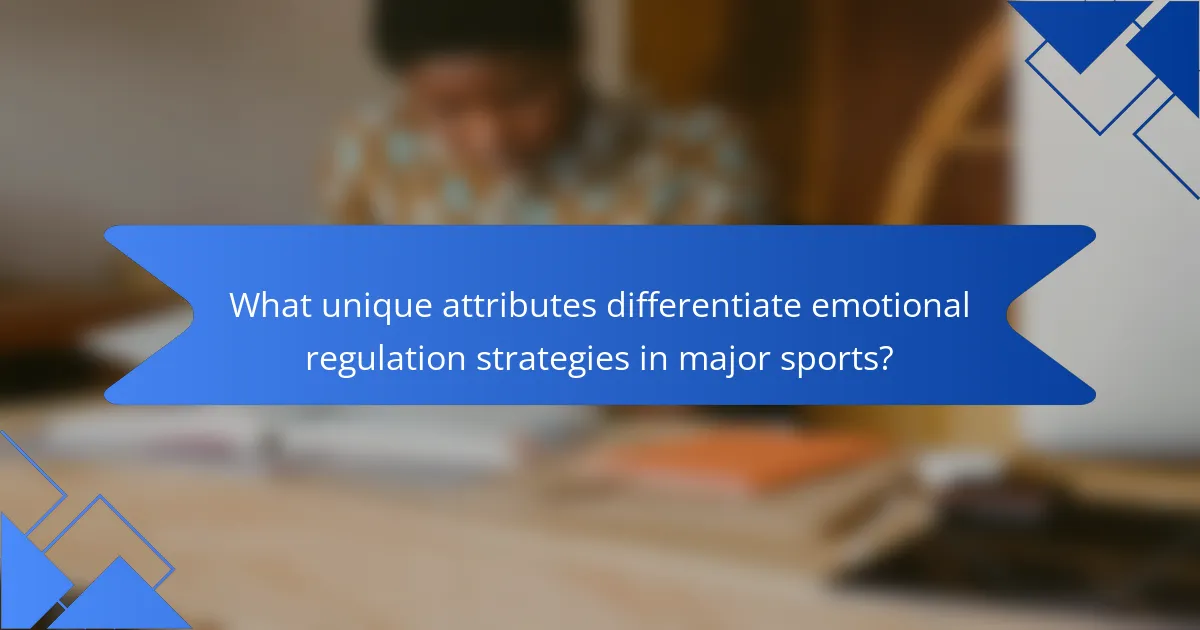
What unique attributes differentiate emotional regulation strategies in major sports?
Emotional regulation strategies in major sports differ by their unique attributes, including context specificity, technique variety, and athlete personality alignment. Context specificity involves tailoring strategies to the unique demands of each sport, such as high-pressure situations in basketball versus endurance challenges in marathon running. Technique variety encompasses approaches like mindfulness, cognitive restructuring, and self-talk, each serving different emotional needs. Athlete personality alignment ensures that strategies resonate with individual traits, enhancing effectiveness. These unique attributes collectively enhance athletes’ performance, focus, and resilience.
How do team dynamics influence emotional regulation in team sports?
Team dynamics significantly impact emotional regulation in team sports by fostering a supportive environment. Positive interactions among teammates enhance emotional resilience, enabling athletes to manage stress effectively. Cohesion and communication within a team can lead to improved focus and performance under pressure. For instance, teams that engage in regular feedback and open discussions cultivate trust, which is vital for emotional stability. Ultimately, strong team dynamics create a culture that promotes emotional well-being, allowing athletes to thrive in competitive situations.
What unique challenges do individual athletes face in emotional regulation?
Individual athletes face unique challenges in emotional regulation that can significantly impact their performance. These challenges include heightened pressure to succeed, social isolation, and the struggle to maintain motivation. The intense scrutiny from coaches and fans can lead to anxiety, while the solitary nature of training can exacerbate feelings of loneliness. Additionally, athletes often grapple with balancing personal expectations and external demands, which can hinder their emotional resilience. Addressing these challenges through tailored emotional regulation strategies is crucial for enhancing focus and overall performance in sports.
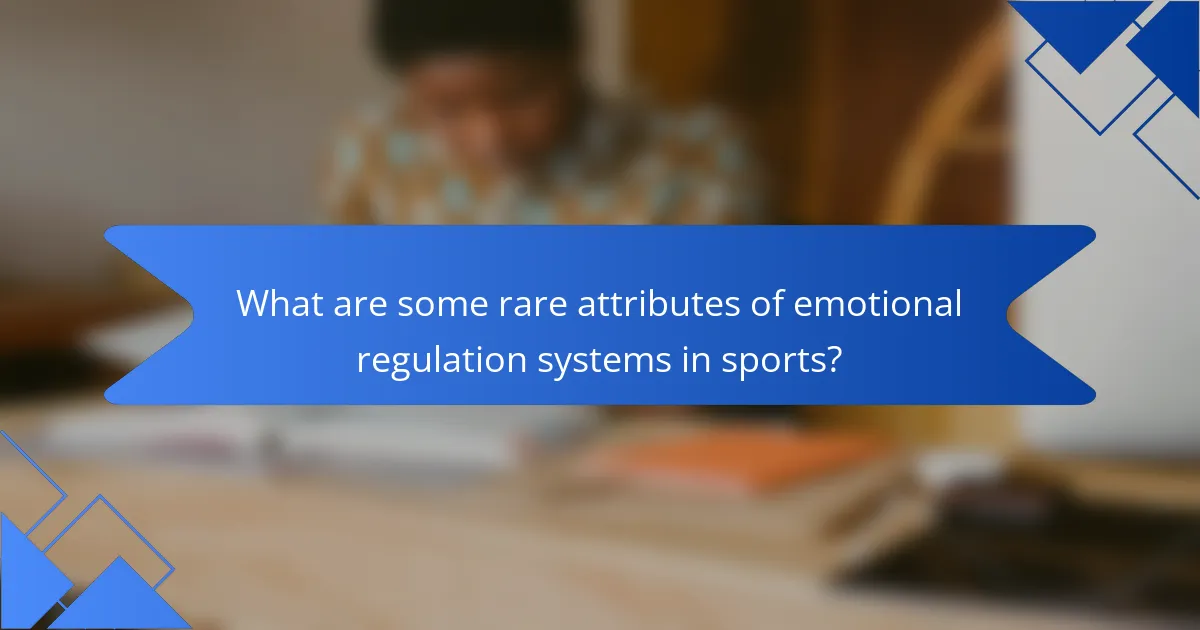
What are some rare attributes of emotional regulation systems in sports?
Rare attributes of emotional regulation systems in sports include adaptability, which allows athletes to modify their emotional responses based on situational demands, and neuroplasticity, enabling the brain to rewire itself through training. Another rare attribute is the integration of mindfulness techniques, fostering enhanced self-awareness and emotional control. Lastly, the use of biofeedback tools is uncommon but effective, providing real-time data to help athletes regulate their emotions during competition.
How do cultural factors impact emotional regulation among athletes?
Cultural factors significantly influence emotional regulation among athletes by shaping their coping strategies and responses to stress. Different cultures emphasize various emotional expressions, which can affect how athletes manage their feelings during competition. For instance, collectivist cultures may promote group cohesion and support, enhancing emotional resilience, while individualistic cultures may encourage personal accountability, impacting emotional regulation strategies. Understanding these cultural nuances helps athletes adopt effective emotional regulation techniques tailored to their background, ultimately enhancing performance and focus in sports.
What innovative approaches are emerging in emotional regulation for athletes?
Innovative approaches in emotional regulation for athletes focus on mindfulness, cognitive restructuring, and technology integration. Mindfulness training enhances awareness and control over emotions, improving focus and resilience. Cognitive restructuring techniques help athletes reframe negative thoughts, fostering a positive mindset. Furthermore, wearable technology provides real-time feedback on physiological responses, enabling athletes to manage stress effectively. These strategies collectively enhance performance and mental well-being in competitive sports.
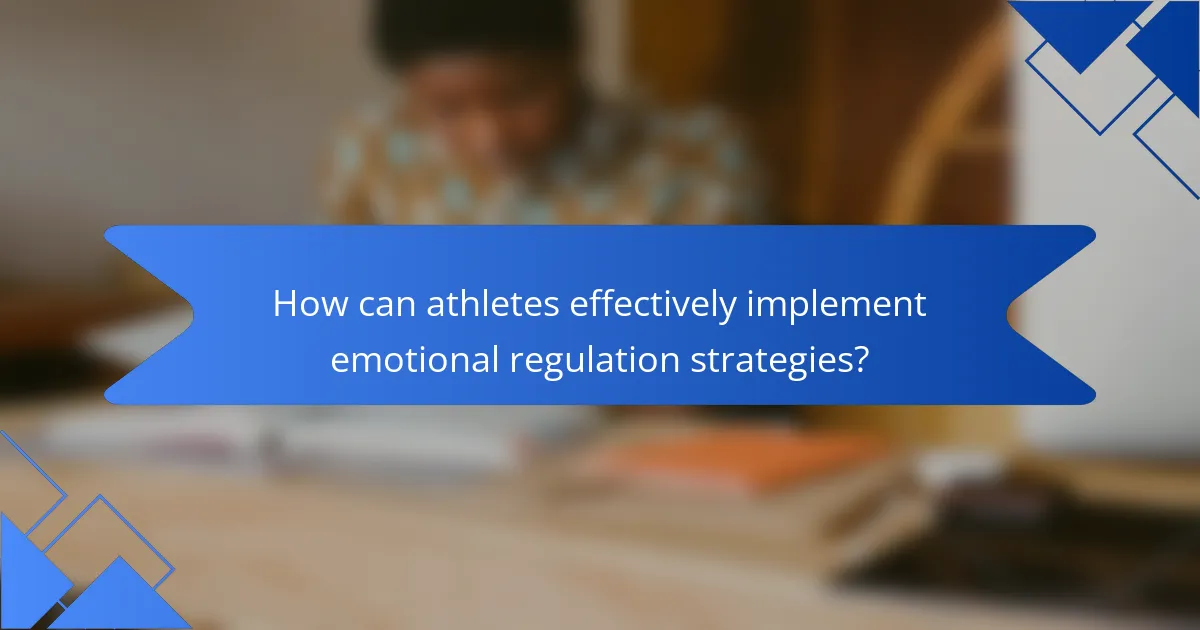
How can athletes effectively implement emotional regulation strategies?
Athletes can effectively implement emotional regulation strategies by practicing mindfulness, cognitive restructuring, and goal-setting. Mindfulness enhances awareness of emotions, enabling athletes to manage stress and focus better. Cognitive restructuring helps reframe negative thoughts, fostering a positive mindset. Goal-setting provides direction, motivating athletes to stay resilient during challenges. These strategies collectively enhance performance and focus in competitive environments.
What are the best practices for training emotional regulation skills?
To effectively train emotional regulation skills, athletes should practice mindfulness, cognitive restructuring, and relaxation techniques. These strategies enhance performance by improving focus and resilience.
Mindfulness involves being present and aware of emotions without judgment, which helps athletes recognize emotional triggers. Cognitive restructuring allows athletes to challenge negative thoughts and replace them with positive affirmations. Relaxation techniques, such as deep breathing and visualization, reduce anxiety and promote calmness during competition.
Regular practice of these strategies leads to improved emotional control, ultimately enhancing overall athletic performance.
What common mistakes do athletes make in emotional regulation?
Athletes often struggle with emotional regulation by mismanaging stress, failing to recognize emotions, and using ineffective coping strategies. Common mistakes include ignoring emotions until they escalate, relying on avoidance rather than addressing feelings, and underestimating the impact of emotions on performance. These missteps can lead to decreased focus, increased anxiety, and impaired resilience during competition. Developing awareness and implementing proactive emotional regulation strategies can significantly enhance athletic performance.
How can technology aid in emotional regulation for athletes?
Technology aids emotional regulation for athletes by providing tools that enhance focus, resilience, and performance. Wearable devices track physiological responses, helping athletes recognize stress levels. Apps offer guided mindfulness and breathing exercises, promoting emotional awareness. Virtual reality training simulates high-pressure situations, allowing athletes to practice coping strategies. Data analytics identifies patterns in emotional responses, enabling personalized interventions. These technologies support athletes in maintaining optimal mental states during competition.
What expert insights can enhance emotional regulation strategies for athletes?
Expert insights can significantly enhance emotional regulation strategies for athletes by incorporating mindfulness, cognitive restructuring, and biofeedback techniques. Mindfulness practices improve present-moment awareness, reducing anxiety and enhancing focus. Cognitive restructuring helps athletes reframe negative thoughts, fostering resilience. Biofeedback provides real-time data on physiological responses, enabling athletes to regulate emotions effectively. Integrating these strategies can lead to improved performance and mental well-being in competitive sports.
